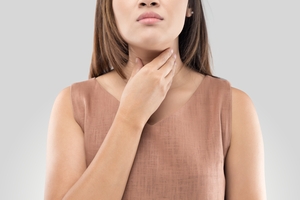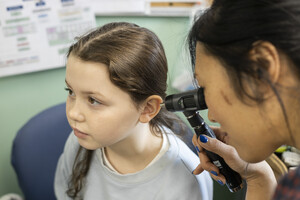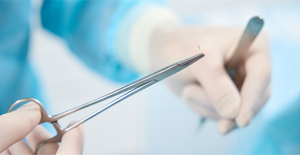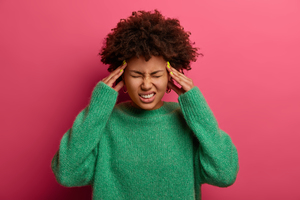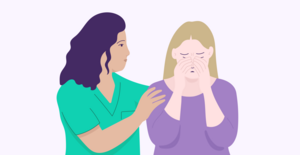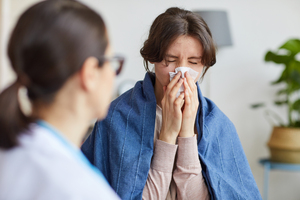Cystic Acne Treatment
Cystic acne is the presence of acne cysts—in other words, pimples filled with pus—under the skin. These cysts can be painful and quite visible to yourself and others, and if not treated can lead to infection and possibly scarring. However, there are also steps you can take to prevent and treat acne cysts on your own.
Below, we cover what cystic acne is, where it comes from, and what options you have to treat and manage it.
Cystic acne: What is it?
According to Healthline, cystic acne is a condition that occurs when bacteria become trapped in the skin’s pores beneath a layer of oil and dead skin, which clog the pore. These bacteria grow and cause inflammation, swelling, and pain deep below the skin’s surface.
Because cystic acne is the most severe type of acne, it is recommended that you see a dermatologist to prevent infection and scarring, reports Healthline
How does an acne cyst differ from an acne nodule?
Acne nodules and acne cysts may look and feel similar—they’re both painful red bumps under the surface of your skin, after all. While both can lead to scarring, there are two key differences according to Healthline:
- Acne nodules do not contain fluid.
- Acne cysts contain pus, which makes them softer to the touch.
Causes and Symptoms
The following is basic information on the causes and symptoms of cystic acne:
What’s the cause of cystic acne?
Cystic acne occurs when the skin’s pores become clogged with dead skin cells and oil. Because the pores cannot “breathe,” they become a breeding ground for bacteria—and with more than 1.5 trillion bacteria living on your skin, it’s not surprising they occasionally find their way in, notes Healthline.
Once they’re there and begin multiplying, the expansion gets trapped in the dermis, which is the middle layer of the skin. The result? An infected, swollen lump: an acne cyst, reports Healthline.
According to Healthline, the most common causes of cystic acne include:
- Being a teenager, as this is when our skin’s oil production tends to be highest
- Going through menopause
- Stress
- A family history of cystic acne
What are the symptoms of cystic acne?
According to Healthline, cystic acne generally looks like red boils, and generally has the following characteristics:
- A red bump
- Tender to the touch
- Sized between a pea and a dime
- May have a white or yellow crusty head
- Cystic acne may also itch due to infection
Where is cystic acne found?
The most common sites for acne cysts are your face (by far the most common), butt, back, neck, chest, shoulders, and upper arms, notes Healthline.
Diagnosis
Here we cover how to find out if your condition is cystic acne.
How can I have my cystic acne diagnosed?
To determine whether those red bumps are cystic acne or something else, we rely on dermatology. A dermatologist is a medical doctor trained in treating skin conditions; if they diagnose you with cystic acne, they will be able to recommend and/or prescribe treatments.
Treatment and Management
Your dermatologist will be the best source for knowing how to manage and treat your cystic acne. Below you’ll find some helpful information to get you started:
How can I manage and treat my cystic acne?
Cystic acne is a difficult condition to treat because of the sensitive nature of the affected area, notes the Cleveland Clinic. You don’t want to go popping pimples on your face repeatedly, as this can lead to long-term scarring. A dermatologist can instruct you on how to care for your cystic acne.
Some acne cysts may take over three months to clear up. According to the Cleveland Clinic, cystic acne treatment options include:
- Oral antibiotics
- Creams, lotions, and gels with antibiotics to decrease the population of bacteria on your skin
- Salicylic or azelaic acid to remove dead skin cells and kill bacteria
- Benzoyl peroxide, which also helps kill skin bacteria
- Retinoids that help remove dead skin cells
Are there other cystic acne treatments?
Some other ways to treat cystic acne, according to the Cleveland Clinic include:
- Injected corticosteroids, which shrink particularly large and tender cysts
- Lancing and draining, which removes pus and reduces painful pressure
- Birth control, which can lower hormone levels in women
- Isotretinoin, which is a retinoid taken by mouth
Are there complications to cystic acne?
According to the Cleveland Clinic, the main complications of cystic acne are scarring and discoloration. If you open up your acne cysts, such as by popping them, you increase the risk that your skin will scar. You also open the door to the possibility of cellulitis, a skin infection.
Additionally, you may notice discoloration where the acne once was, ranging from black to pink. Don’t worry, though—these usually clear up on their own, they just take some time to do so.
Prevention
Learning to prevent cystic acne is the most vital step, according to the Cleveland Clinic. While there is no single cystic acne home remedy, the following information can help prevent it:
What steps can I take to prevent cystic acne?
Try incorporating the following into your daily life as noted by the Cleveland Clinic:
- Wash your face each morning, night, and after exercise using a mild foaming facial cleanser, lukewarm water, and your hands. Do not use an abrasive cloth or sponge.
- Moisturize your face with an oil-free moisturizer if needed.
- Make sure any facial product you use is non-comedogenic.
- Never sleep in your makeup.
- Don’t touch your face during the day.
- Leave pimples alone—don’t pop or pick them.
- Keep hair off your face, as it contains oils.
- Try to avoid oily places like fast-food restaurants.
- Try to avoid things like dairy and sugar and see if this affects your acne.
Outlook
Here’s what the outlook is if you have cystic acne:
What can people who have cystic acne expect?
Most of the time, cystic acne will clear up on its own with age notes the Cleveland Clinic. Additionally, making small lifestyle and behavioral changes (see the previous section) can help prevent breakouts from occurring and can make current breakouts go away more quickly.
The effects of cystic acne can include self-consciousness, anxiety and depression, and long-term scarring. However, you’re not alone—acne afflicts 50 million people in the U.S. alone according to data from the Cleveland Clinic. Make sure to talk with a healthcare professional if you’re feeling bad about your self-image.
Living With Cystic Acne
Here’s when to take action:
When is it time to call the doctor?
The Cleveland Clinic notes that Iit’s time to get your healthcare provider involved if:
- You have pimples that are distractingly painful, swollen, or red.
- Your scarring or acne is giving you a negative self-image.
- It looks like your skin may be getting infected.
What questions should I ask?
Ask the following questions to your doctor:
- What’s causing my cystic acne?
- What is the best cystic acne treatment for me?
- Are there any side effects to be aware of?
- How can I prevent acne cysts?
- How can I make sure I don’t have scarring or infection?
Summary
Remember not to pick at your acne—it’s best to call a dermatologist and get treated for better long-term results. You’ll also learn how to prevent your acne and identify whether you can make changes to prevent it from happening in the first place.
Find the best Urgent Care centers near you and see how your friends rated them by visiting Solv.
Find Cystic Acne Treatment near you
- Alabama
- Alaska
- Arizona
- Arkansas
- California
- Colorado
- Connecticut
- Delaware
- Florida
- Georgia
- Hawaii
- Idaho
- Illinois
- Indiana
- Iowa
- Kansas
- Kentucky
- Louisiana
- Maine
- Maryland
- Massachusetts
- Michigan
- Minnesota
- Mississippi
- Missouri
- Montana
- Nebraska
- Nevada
- New Hampshire
- New Jersey
- New Mexico
- New York
- North Carolina
- North Dakota
- Ohio
- Oklahoma
- Oregon
- Pennsylvania
- Rhode Island
- South Carolina
- South Dakota
- Tennessee
- Texas
- Utah
- Vermont
- Virginia
- Washington
- Washington DC
- West Virginia
- Wisconsin
- Wyoming
Cystic Acne Treatment FAQs
How to get rid of cystic acne
The best way to treat your cystic acne is to visit a dermatologist. Your doctor will assess your skin’s unique needs and arm you with actionable treatment plans.
What is cystic acne?
Cystic acne is a skin condition in which bacteria become trapped in the skin’s pores underneath a layer of dead skin and oils. This causes infection and the formation of painful, pus-filled pimples according to Healthline.
What causes cystic acne?
According to Healthline, cystic acne is caused by bacteria becoming trapped inside the skin’s pores, underneath a layer of dead skin and oils.
How to treat cystic acne
According to Healthline, cystic acne is best treated by washing your face with a gentle facial cleansing solution several times a day. However, in many cases, a dermatologist is needed to prescribe medicine to treat cystic acne.
What causes pimples?
Pimples are caused by bacteria trapped inside your pores under a layer of dead skin and oils. Protected from the outside air and cleaning, this allows the bacteria to proliferate and cause an infection, reports Healthline.
Why does my pimple hurt?
Pimples hurt because there is a large amount of pressure under the skin. This is usually caused by bacteria-fueled pus.
Why does my acne itch?
Your acne may itch because of an infection. See a doctor to diagnose and treat the problem.
How to prevent cystic acne
To prevent cystic acne, wash your face using your fingers and a mild foaming facial cleanser after exercising and in the mornings and evenings. If it’s dry, use an oil-free moisturizer. Keep your face clean and free of oils: don’t sleep in your makeup, don’t touch your face, and leave pimples alone, notes the Cleveland Clinic.
How to heal cystic acne
Continue washing your face regularly and avoiding certain products and techniques, notes the Cleveland Clinic However, if you notice scarring, itching, or persistent acne, see a dermatologist for effective treatment.
Where can I get cystic acne treated?
Your dermatologist is the best place to treat cystic acne.
Solv has strict sourcing guidelines and relies on peer-reviewed studies, academic research institutions, and medical associations. We avoid using tertiary references.
Everyday Healthcare, Simplified
Expert advice to help you live your best life

